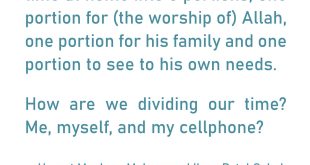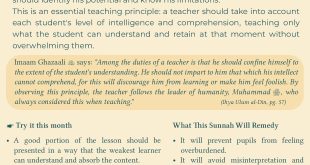Following the Rasūl of Allāh Sallallāhu ‘Alayhi Wa Sallam: An obligation upon mankind until Qiyāmah
In many Āyāt of the Qur’ān Karīm, we are commanded to follow Allāh Ta’ālā and His Rasūl Sallallāhu ‘Alayhi Wa Sallam: Allāh Ta’ālā says, “And obey Allāh and obey the Rasūl, and beware.” (Al-Qur’ān, 5/92)
In another verse, Allāh Ta’ālā equates obedience to Nabī Sallallāhu ‘Alayhi Wa Sallam to His own obedience: “Whoever has obeyed the Rasūl has obeyed Allāh.” (Al-Qur’ān 4/80)
Elsewhere, Allāh Ta’ālā has also warned of the consequences of disobeying or opposing Nabī Sallallāhu ‘Alayhi Wa Sallam: “So let those who disobey his command be wary of a trial afflicting them, or a painful punishment.” (Al-Qur’ān 24/63)
‘Ulamā mention that in the above verse (5/92), Allāh Ta’ālā repeats the verb ‘Obey’, signifying that the obedience of Rasūllulāh Sallallāhu ‘Alayhi Wa Sallam is an independent requirement. So, if the Rasūl of Allāh Sallallāhu ‘Alayhi Wa Sallam commands something, it becomes necessary to carry it out, whether this command is found in the Qur’ān or not.
This obedience is binding upon every Muslim, not just upon those who were in direct contact with Nabī Sallallāhu ‘Alayhi Wa Sallam. Now, ponder for a moment! How would it be possible to obey Nabī Sallallāhu ‘Alayhi Wa Sallam if there were no system in place to preserve his words and teachings
The unique system used to document the blessed Ahādīth
Throughout time, humans have always had to document history. To collate and learn from the past, society has always had to formulate systems and rely on them to establish the existence of a person or event, or to be able to sift fact from fiction.
Similarly, the Sahābah Radiyallāhu ‘Anhum and those after them were obliged to preserve Dīn. Allāh Ta’ālā guided them towards an amazing and unique system; one that withstood the test of time.
The first link, the Sahābah Radiyallāhu’ Anhum
The Sahābah Radiyallāhu ‘Anhum transmitted whatever they learnt from Nabī Sallallāhu ‘Alayhi Wa Sallam to their students. Their religiousness, truthfulness, and caution in transmitting Hadīth are well known. Certain Sahābah Radiyallāhu ‘Anhum transmitted very few Ahādīth out of caution, thoroughly verifying and cross-checking what they heard before narrating.
Hāfiz Ibn ‘Abdil Barr Rahimahullāh writes: “From the greatest means of learning the Sunnah, is the acknowledgement of those who transmitted it from Rasūlullāh Sallallāhu ‘Alayhi Wa Sallam to mankind in general (i.e. the Sahābah Radiyallāhu ‘Anhum). Those who memorised it and passed it on as well-wishers, hoping for reward…” (Al-Istī’āb, 1/1)
Isnād (the chain of narrators)
The chain of narrators of any particular Hadīth has been carefully documented. Often, when we attend a completion of Bukhāri Sharīf, we hear a list of names of those who narrated the last Hadīth recorded in the compilation of Imām Bukhāri Rahimahullāh. Similar chains of narrators are recorded for every Hadīth. Through this system, we are able to ensure the authenticity of Hadīth.
A Tābi’ī, Hishām bin ‘Urwah Rahimahullāh, advised: “If anyone narrates a Hadīth to you, ask him: ‘From who (did you hear this)?!’ i.e. through which chain are you narrating this Hadīth from Nabī Sallallāhu ‘Alayhi Wa Sallam? (Al-Jarh Wa-Ta’dīl, 2/34)
‘Abdullāh Ibn Mubārak Rahimahullāh says: “Isnād (the chains of narration) are part of Dīn. If it wasn’t for Isnād, anyone could have said whatever they want!” (Sahih Muslim, 1/15)
Sufyān at-Thawri Rahimahullāh described it in this way: “Isnād is the weapon of a Mu’min. If he doesn’t have a weapon, what will he fight with?!” They saw this as an indispensable part of ‘Ilm and Dīn. (Sharaf Ashāb Al-Hadīth, 1/42)
Rijāl (Recording the biographies of each of the narrators of Hadīth)
The ‘Ulamā took great pains in gathering the names, birth and death dates, and biographies (lives, practices, teachers, etc.) of each of the narrators of Hadīth. In this way, they were able to establish whether a person actually met the one from whom he narrated, whether he was trustworthy or not, or whether he even existed at all!
Imām Shātbi Rahimahullāh states: “Their statement: ‘Isnād is from Dīn’ doesn’t only refer to a Muhaddith saying: ‘So-and-so narrated from so-and-so’, rather, they mean everything that the science encompasses (including) the information of the men that they narrate from…” (Al-I’tisām, 1/225)
This is another system for the preservation of this great fortress of Dīn. Many ‘Ulamā have dedicated their entire lives to the science of Rijāl.
Additional structures
Despite the strength of the systems of Isnād and Rijāl, ‘Ulamā also put further systems in place to strengthen the science of Hadīth. Such systems include: searching for corroborating narrations, analysing the wording used in the narrations, examining the meanings of the Ahādith in light of the Qur’ān Karīm and stronger Ahādith, etc.
The ‘Ulamā’ also wrote numerous Kitābs regarding weak and unreliable narrators, as well as fabricated narrations.
The bedrock of every science; the ‘Ulamā
Together with the academic systems put in place to preserve Hadīth, Allāh Ta’ālā favoured this Ummah with giants amongst men; the ‘Ulamā. They had a great desire for Dīn and ‘Ilm, and were blessed with extraordinary memories. Accounts of their sacrifice for ‘Ilm and their mastery in it are innumerable.
Imām Ahmad Rahimahullāh, for example, is reported to have memorised hundreds of thousands of Ahādīth. His most famous book, the Musnad of Imām Ahmed Rahimahullāh, contains approximately 28295 Ahādīth.
When Imām Bukhāri Rahimahullāh came to Baghdad, the ‘Ulamā gathered to test his legendary memory. A hundred random Ahādīth were read to him, with the words and chains of narration distorted. Imām Bukhāri Rahimahullāh, from memory, repeated each one of these narrations and duly rectified its chain and wordings! (Fathul Bārī, 1/486)
The danger of negating the Hadīth
If one negates the Ahādīth, he is left with a head without a body; how will he fulfil the injunctions of the Qur’ān Karīm? He has been commanded to perform Salāh, to fast, to give Zakāt, and to do Hajj, but the details are found in the Sunnah. Certain Masā’il are only found in the Sunnah. Can one ever practice Islām without the Ahādīth?
Once, the Sahabi, Imrān bin Hussain Radiyallāhu ‘Anhu, was seated in a gathering. A person said, “Only narrate to us what is mentioned in the Qur’ān!” Imrān Radiyallāhu ‘Anhu asked him to come nearer and explained: “Tell me, if you and your friends were to be confined to (taking Dīn from) the Qur’ān, would you find in it that Zuhr Salāh is four Rakāts, Asar Salāh is four Rakāts, and Maghrib is three Rakāts and that a surah is recited in only the first two Rakāts? Would you find in it, that a Tawāf consists of seven rounds and that Sa’ī between Safa and Marwa is also done seven times?” Imrān Radiyallāhu ‘Anhu then said: “O People, take (the Ahādīth) from us, because if you do not do so, you will be misguided.” (Khatīb in Al-Kifāyah, 1/83)
It can confidently be said that there is no one in history whose biography has been documented like that of Nabī Sallallāhu ‘Alayhi Wa Sallam, where so much effort has been made to record who met him, who narrated from him, who narrated from those who narrated from him and so on. Many books have been written in this regard. In these books, the detailed biographies of up to thousands of Sahābah Radiyallāhu ‘Anhum have been recorded. In the books of Asmā ur Rijāl, the biographies of tens of thousands of Tābi’īn and Tab-ut Tābi’īn have been recorded. It is clear that the great work done in preserving the life of Nabī Sallallāhu ‘Alayhi Wa Sallam is nothing but a miracle of Islām.
May Allāh Ta’ālā guide us and accept us to be among those who stand up and defend the Dīn of Allāh Ta’ālā at all times. Āmīn
A049 – 25 Safar 1447 / 20 August 2025
 Wifāq ul Ulāma (SA) ASSOCIATION OF SOUTH AFRICAN 'ULAMA
Wifāq ul Ulāma (SA) ASSOCIATION OF SOUTH AFRICAN 'ULAMA


